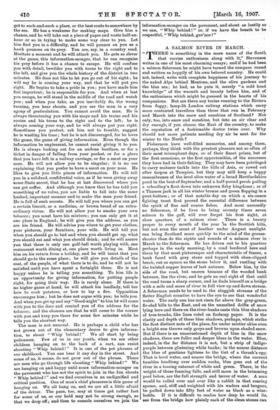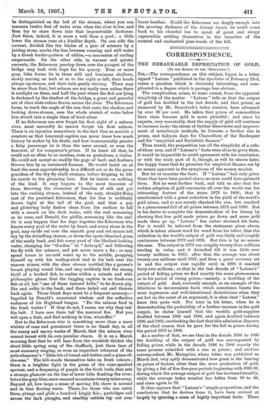A SALMON RIVER IN MARCH.
" /THERE is something in the mere name of the South
that carries enthusiasm along with it," Stevenson writes in one of his most charming essays; and if he had been a salmon fisherman he might have turned the compass round and written as happily of his own beloved country. He could not, indeed, write with complete happiness of his journey to the naked Alps behind Mentone, and the olive gardens and the blue sea ; he had, as he puts it, merely "a cold head knowledge" of the warmth and beauty before him, and of the enthusiasm which might be guessed in the hearts of his companions. But are there any trains running to the Riviera from foggy, lamp-lit London railway stations which carry more contented travellers than those that run in February and March into the snow and sunshine of Scotland? Not only, too, into snow and sunshine, but into an air clear and dry enough, if you choose the East of the country, to make the reputation of a fashionable doctor twice over. Why should not more patients needing dry air be Bent for the winter to the North ?
Fishermen have well-filled memories, and among them, perhaps, they think with the greatest pleasure not so often of their most triumphant days, or of their finest prizes, but of the first occasions, or the first opportunities, of the successes they have had in their fishing. They may have been privileged to carry mahseer tackle into the hills of Asia, or rowed out after tarpon at Tampico, but they may still keep a happy remembrance of the level olive water of a broad Hertfordshire pond in the beat of September, and a half .pound perch pulling a schoolboy's float down into unknown fishy kingdoms ; or of a Thames jack in all his winter bronze and green flopping in a punt-bottom ; or of that notable day on which a six-ounce fighting trout first proved the essential difference between the spirit of fine and coarse fishes. And most assuredly no fisherman, if be lives to bring seventy times seven salmon to the gaff, will ever forget his first sight, at close quarters, of a salmon river. There is a beauty proper to every month of the year 'in the Scottish bills, but not even the scent of heather under August sunlight can bring Scotland more quickly to the mind of the grouse- shooter than do the sights and sounds of a salmon river in - March to the fisherman. He has driven out to his quarters perhaps in the early morning, by a road bordered here and there by that most picturesque and characteristic of fences, a bank faced with grey stone and topped with close-clipped beech, cut as square as the stone below it, and rustling with the twisted copper leaves of last autumn. Below him, by the side of the road, but unseen because of the wooded bank between, lies the river, and he gets no real sight of that until the road turns a sharp corner, and be finds himself on a bridge with a mile and more of river in fall view up and down stream. A fisherman needs to be used to the sluggish streams of the flatter English counties to have the eye to see that wonderful water. The early sun has not risen far above the grey-green, fir-clad hills to the East, and on the unmelted drifts of snow lying here and there on the river-banks caste thin blue shadows of tree-trunks, like lines ruled on foolscap paper. It is the clarity and depth of those blue shadows, perhaps, which strike the first distinct note of the place, for under mistier skies even a bright sun throws only greys and browns upon shaded snow. But if there is an unaccustomed depth of blue in the snow shadows, there are fuller and deeper blues in the water. Blue, indeed, in the far distance it is not, but a strip of indigo. purple between glistening white banks; in the nearer distance the blue of gentians lightens to the tint of a thrush's egg. That is level water, and nearer the bridge, where the current tumbles headlong over sudden rocks, blue goes out of the river in a tossing cataract of white and green. There, in the weight of those foaming falls, and still more in the brimming pool below, are the fall strength and terror of water. A man would be rolled over and over like a rabbit in that roaring spume, and, stiff and weighted with his waders and brogues, be pulled down into fifty feet of water as black as a wine- bottle. If it is difficult to realise how deep he would lie, see from the bridge how plainly each of the clean stones can
be distinguished on the bed of the stream, where you can measure twelve feet of water even when the river is low, and than try to stare down into that impenetrable darkness. Just there, indeed, it is more a well than a pool ; a little lower the stream runs at a kindlier depth. On one side the current, divided like the blades of a pair of scissors by a jutting stone, marks the line between running and still water by a Greek border-pattern of eddies,—a succession of curling ampersands. On the other side, in warmer and quieter currents, the fisherman peering down over the parapet of the bridge may look with hope for his quarry. Four or more grey, lithe forms lie in those still and luminous shallows, slowly moving an inch or so to the right or left, their heads always up-stream, and their tails gently stirring. There may be more than four, but salmon are not easily seen unless there is sunlight on them, and half the pool where the fish are lying Is darkened by the shadow of the bridge, a great and graceful arc of clear slate.colour drawn across the river. 'The fisherman turns, to mark the angle of the sun that casts the shadow, and looking down-stream, sees the whole stretch of water below him struck into a single blaze of level silver.
If no fisherman can ever forget his first sight of a salmon river, most assuredly he cannot forget his first salmon. There is an injustice somewhere in the fact that so notable a creature as that honoured captive can never know how much history he makes by his death, and how immeasurably greater a fishy personage he is than the mere second, or even the heaviest, of his conqueror's'prizes. If lie knew all that, he could not so often be so careless, even so gratuitous, a victim. He could not accept so readily the gage of barb and feathers thrown him by an untutored foeman. He would insist on at least the same apprenticeship to a difficult art as do the gross grandees of the dry-fly chalk-streams, before deigning to lift his nozzle to the gleaming lure. But he insists on nothing of the kind. It may happen to the most innocent of tiros, throwing the clumsiest of bunches of silk and gut into the rushing stream, instead of the easy, straight-flung cast of the practised fisherman, that his line is suddenly drawn tight at the tail of the pool, and that a gay and glittering body dashes clean from the surface to fall with a smack on the dark water, with the reel screaming as he runs, and Donald, the ghillie, screaming like the reel. Or it may happen that for days together the fisherman who knows every pool of the water by heart, and every stone in the pool, may stride out over the smooth grey and red atones left dry by the dwindling stream, or down the spate-bleached grass of the sandy bank, and fish every yard of the likeliest-looking water, changing his "Gordon" to " Ackroyd," and following the fly with the minnow, and yet never move a fin ; or may spend hours in ice-cold water up to his middle, propping himself up with his wading-stick tied to his belt over the uneven stones, with the clear stream mottled like a grouse's breast playing round him, and may suddenly feel the strong thrill of a booked fish, to realise within a minute and with philosophic gloom that the tugging captive is no fresh-run fish at all, but "one of those tamned kelts," to be drawn pig- like and sulky to the bank, and there tailed out and thrown back again. Those blank days must be a frequent memory,— beguiled by Donald's occasional wisdom and the reflective cadences of his Highland tongue. "Do the salmon feed in the fresh wetter P If they do not, I canna see why they talc' the bait. I have seen them tak' the na.etural flee. But you will open a fush, and find nothing in him, wbateffer."
But to the fisherman who is something more than a mere wielder of cane and greenheart there is no blank day, in all the sunny and snowy weeks of March, that the salmon river cannot invest with its own peculiar charm. It is on a March morning first that he will hear from the woodside thicket the short little spring song of the chaffinch, just three bars of most summery singing, or even an imperfect rehearsal of the yellowhammer's " little-bit-of-bread-and-butter-and-a-piece-of- che-eese." The hill-woods themselves take on fresh colours ; there is a brighter light in the green of the cone-specked spruces, and a deepening of purple in the birch buds, that sets a strange glamour on the line of lower hills flanking the river, below the grey-blue, snow-seamed mountains twenty miles away. Beyond all, how large a sense of moving life there is around and in that flowing water. There, for those who can catch them, plunge and glide a hundred kingly fish ; partridges call across the dark ploughs, and stealthy rabbits lop out over burnt heather. Could the fisherman see deeply enough into the growing darkness of the distant forest, he could come back to his cheerful inn to speak of great and sleepy capercailzie settling themselves in the branches of the scented and enchanted pine-woods of the hill.











































 Previous page
Previous page